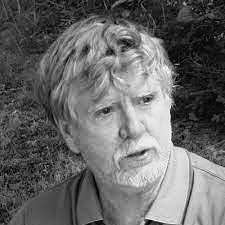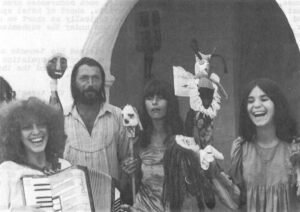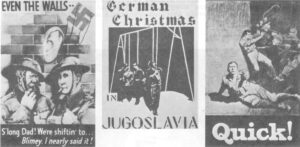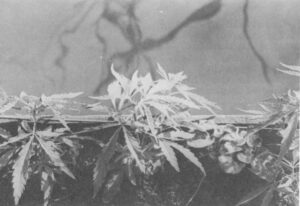Jim Hougan
- 1972

Fellowship Title:
- Contemporary Youth Movements in Western Europe
Fellowship Year:
- 1972

Snif!: A Comic Commune
September 28, 1972 Ibiza, Spain The big blue van, a smear of dust and dents and rust, jerked into the central square of Santa Eulalia, back-fired and clattered to a stop. Slowly, its back-doors opened, groaning on ancient hinges. And then, tentatively, putting one foot in front of another and finally sliding onto the pavement, out stepped — Right. A wrinkled green giant with red horns and temple bells. George, an expatriate bartender who left New York for Ibiza’s solitude, who wanted to write the Great American Novel or, failing that, a very dirty one, swore to himself, grabbed his groceries, and left: the last time something like this happened the police took to beating anyone who wasn’t wearing a crew-cut or carrying a cane. Meanwhile, the van was disgorging a painted cargo of wizards and elves, clowns and puppets, a French accordionist and a barking Dalmatian in period costume. Somehow (people will watch anything) a crowd gathered. Spanish fishermen, farmers, German tourists, hippies and bell-boys gravitated toward the Square where the happening unfolded

What Did You do in the Great War, Daddy?
August 8, 1972 London The Imperial War Museum, a hulking presence on the seedier side of the River Thames, gathers dust behind a brace of World War II cannons carefully centered on a shaven lawn that leads to the Museum’s impressive front doors. Inside, a righteous mustiness prevails shakily over the glee of schoolchildren touring the exhibits. Only three stations away on London’s Underground, in the shadow of a monument to Lord Nelson, the Institute of Contemporary Arts (ICA) bustles with a militant liberalism and hip patronage. In its modest ground-floor quarters ghosts of old Encounter sessions, psychodramas, rock bands and avant-garde films mingle trendily to evoke a with-it atmosphere. Ostensibly poles apart, the one a repository of war-time relies and the other a catalyst of cultural activism, the two institutions invited comparison recently when they staged what amounted to complementary exhibits. At the Imperial War Museum one of the world’s largest collections of World War I and World War II propaganda posters lined the corridors in a dazzling confusion of symbols, pleas, and

Havamarawanna: A Floating Alternative Nursery
July 21, 1972 Magic Center Western Asphalt Jungle (Amsterdam) At 41, Kees Hoekert claims to be the greatest and most skillful dealer of marijuana in the Western Hemisphere. Kees Hoekert, 41-yearsold, and the best marijuana dealer in the Western Hemisphere. He may be right. As head of the Lowland Weed Company, this intense, affable Dutchman is charged with the loving care, maintenance, and distribution of enough marijuana to keep the counter-culture high for as long as they can handle it. The company offices are aboard a comfortably dilapidated barge moored in Amsterdam’s Kattenburg Canal directly across from the local police station. The site is somewhat historic since it fronts upon the former location of the Dutch East India Company. Moreover, it’s not difficult to find (and Kees likes visitors) because the company boat is emblazoned with a 5-foot high painting of a marijuana leaf. Fore and aft, to starboard and port, topside and inside, a few thousand marijuana plants grow to maturity in weather that made the tulip famous. The view from inside the barge
Blues on Calle Escorza
Guadalajara, Mexico The travel posters call it a “Land of Contrast,” but it might be more accurately described as a nation of violent extremes. There is hunger and gluttony, ruthless poverty and spectacular wealth; superstition, ignorance, and racism co-exist antagonistically with a highly-sophisticated intellectual, academic, and artistic elite. In the mountains of Guerrero, Michoacan, and Chiapas, Leftist guerrillas wage an isolated, seemingly ineffectual, but irksome war of “liberation” against the state. In the streets of Mexico City, right-wing cadres of mercenaries intimidate, sometimes with lethal force, those they consider politically or morally degenerate (the two are usually equated). Freedom of the press is guaranteed, but an editor who strays too far from a stance of centrism or mild reform may find himself unable to obtain paper from the government monopoly controlling that resource. Nevertheless, Marxist and revolutionary publications somehow manage to be published and reach the kiosks. None of which is to say that Mexico is unstable: those who have most of the butter also have most of the guns. Moreover, with only isolated
Farewell, Transvestite String Quartet, Bright Bird Thou Never Wert: The Retirement of Robert Evelyn
“I been havin’ a hard time Livin’ the good life…” From The Grateful Dead’s album,— Workingman’s Dead A great and time-honored tradition was dealt a staggering blow this year and yet (perhaps it was the primaries, the war, or the players’ strike) almost no one noticed. Robert Evelyn, author of seven increasingly filthy novels, has retired from pornography in search of “a straight job.” A giant is gone, victimized by integrity, liberals, “flip-strength,” and the economy. Before alarm seizes pornophiles everywhere, it must be admitted that the tradition of young American expatriates writing dirty books to support themselves abroad continues in competent hands. Others have picked up the torch where Evelyn let it fall, but his retirement has left the field shaken, and insiders are speculating that other tremors may be expected soon. There are grumblings in Amsterdam, and mutters on Ibiza. There is a touch of despair in the Parisian Spring. Robert Evelyn’s retirement, at 29, came on his doctor’s orders and his wife’s insistence while he was still at the height of his
